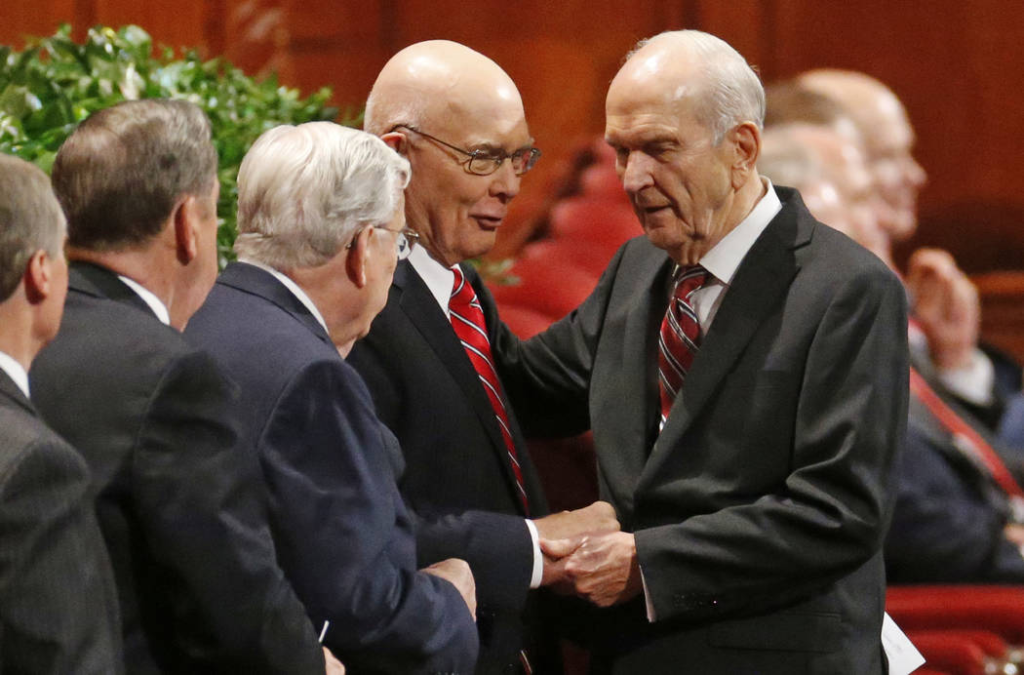The problem
Some who were once religious have lost their faith because they think God doesn’t keep His promises. They read that “if thou shalt hearken diligently unto the voice of the Lord thy God, … the Lord shall make thee plenteous in goods.” (Deuteronomy 28:1, 11.) Latter-day Saints read in the Book of Mormon, “Inasmuch as ye shall keep my commandments ye shall prosper in the land.” (2 Nephi 1:20.) But it is evident that many Latter-day Saints and good people of all religions live in poverty, especially in Third World countries.

The Lord similarly promised the righteous that “The Lord shall cause thine enemies that rise up against thee to be smitten before thy face.” (Deuteronomy 28:7.) And the Book of Mormon prophet Nephi promised, “The righteous that hearken unto the words of the prophets,…behold, they are they which shall not perish.” (2 Nephi 26:8.) But in every war in which Latter-day Saints have fought, Latter-day Saints have also died, along with those of every other faith.

The Lord further said He would make the righteous “plenteous … in the fruit of thy body.” (Deuteronomy 28:11.) Yet worthy couples who would love to have a large family often go childless.

The Word of Wisdom promises that those who avoid tobacco, liquor, coffee and tea “shall run and not be weary, and shall walk and not faint.” (D&C 89:20.) But it is obvious that not everyone in a wheelchair is a smoker or drinker.

The Old Testament prophet Malachi promised those who were faithful in tithes and offerings that the Lord would “open … the windows of heaven, and pour you out a blessing, that there shall not be room enough to receive it.” (Malachi 3:10.) But some tithe payers can’t even pay the rent or medical bills.

Proverbs assures parents that if they “train up a child in the way he should go, … when he is old, he will not depart from it.” (Proverbs 22:6.) But faithful parents sometimes find their children leaving the faith despite their best efforts.

The Ten Commandments indicate that if one honors his father and mother, his days will be “long upon the land.” (Exodus 20:12.) But can we really assume that children run over by cars or who succumb to leukemia were any less appreciative of their parents than others?

So what is happening? Did God really say the things He is reported to have said? Or did overly-enthusiastic “prophets” make it all up? If God really did make those promises, why doesn’t He keep them? If He doesn’t keep His word, why should we?
Or is it possible we have misunderstood what God has said and that somehow He really does fulfill His promises? How can we reconcile the idea of a loving, all-powerful, and completely truthful God with what we see all around us?

Two approaches to a reconciliation
My testimony is that our Father in Heaven really does love us with a perfect love. And He did make all the promises cited above. And He fulfills them all to the letter. But there are two vital keys to understanding how He does so: (1) All of the promises cited have a general, though not necessarily universal fulfillment in this life. (2) All of the promises have a universal fulfillment in eternity. Let me elaborate.
Prospering in the Land
While obviously not all individual active Latter-day Saints are wealthy, as a group in the United States they are above the national average. For example, in 2015, median household income in Utah, with its predominantly Latter-day Saint population, was $62,912, compared to $55,775 for the country as a whole. A 2014 study by the Pew Research Center also showed members of the Church just above the national average, based on the percentage of those in homes with an annual income above $100,000. However, Latter-day Saints were well below Jews, Hindus, Episcopalians, Presbyterians, atheists, and agnostics.

Several factors could contribute to Latter-day Saints being as well off as they are. The Church teaches the importance of work and of self-reliance. Latter-day Saints value education, which tends to lead to better jobs. They spend much less of their income on such vices as tobacco, liquor, and gambling. There is less divorce among Latter-day Saints, and thus fewer single mothers raising their children alone. Those who fall on unexpected hard times can call upon the resources of the Church’s fast offering fund and Bishop’s Storehouse, so no Latter-day Saint is without an available safety net.
However, there are also factors in the religion which work against economic prosperity. Historically, Latter-day Saint mothers have tended not to work outside the home, thus limiting many homes to one income. And the Latter-day Saint proclivity for large families can make the accumulation of a large savings account more challenging.
So can we say that the promise of prosperity in the land in return for obedience to the gospel has been fulfilled? The answer is a qualified yes. The promise was not that the saints would be richer than their neighbors, but that as a group they would be adequately well off. At the very least, they would be better off economically than they would if they were not keeping the commandments. And if the group is reasonably well to do, then they are in a better position to help those individual members who may not have been so successful economically.
We read in the Book of Mormon of a classic case of a group of Nephites who very literally prospered in the land during a time of righteousness. We are told:
And now, because of the steadiness of the church they began to be exceedingly rich, having abundance of all things whatsoever they stood in need—an abundance of flocks and herds, and fatlings of every kind, and also abundance of grain, and of gold, and of silver, and of precious things, and abundance of silk and fine-twined linen, and all manner of good homely cloth.
And thus, in their prosperous circumstances, they did not send away any who were naked, or that were hungry, or that were athirst, or that were sick, or that had not been nourished; and they did not set their hearts upon riches; therefore they were liberal to all, both old and young, both bond and free, both male and female, whether out of the church or in the church, having no respect to persons as to those who stood in need.
And thus they did prosper and become far more wealthy than those who did not belong to their church.
For those who did not belong to their church did indulge themselves in sorceries, and in idolatry or idleness, and in babblings, and in envyings and strife; wearing costly apparel; being lifted up in the pride of their own eyes; persecuting, lying, thieving, robbing, committing whoredoms, and murdering, and all manner of wickedness. (Alma 1:29 – 32)
The Universal, Future Application of the Promise of Prosperity
But the time will come when those who have kept the commandments will not only prosper as a group, but also individually and universally. This will evidently occur to a significant extent even prior to the Millennium. The long-promised Zion will be established, and an economic order will be instituted based upon the law of consecration and stewardship as outlined in the Doctrine and Covenants. The saints will then, as in New Testament times and in the Nephite golden age have all things in common, and as in Enoch’s Zion, there will be no poor among them. (Moses 7:18.)
Following the Millennium, when the earth is renewed, receives its paradisiacal glory, and becomes the promised celestial kingdom, the faithful are promised that “all that my Father hath shall be given unto them.” (D&C 84:33-39.) One can hardly fathom what it will mean to be as rich as God Himself.

Promise of Protection
The scriptures are full of examples of divine protection during conflict. David slew Goliath. Gideon with his 300 men defeated the Middianites. Two thousand Nephite stripling warriors led by Helaman survived without the loss of one man (though all suffered serious wounds). Fleeing Israelites were saved from the Egyptians by the parting of the Red Sea. In the days of the righteous king Hezekiah, the Lord rescued Judah by sending an angel to kill a besieging force of one hundred eighty-five thousand Assyrians during the night.

But the Book of Mormon makes clear that protection in time of war is a general promise to the faithful, not a specific guarantee to each individual combatant. This is well illustrated by the results of a conflict between a Nephite offshoot colony headed by Zeniff and a numerically superior Lamanite force. Zeniff recapitulates:
And God did hear our cries and did answer our prayers; and we did go forth in his might; yea, we did go forth against the Lamanites, and in one day and a night we did slay three thousand and forty–three; we did slay them even until we had driven them out of our land.
And I, myself, with mine own hands, did help to bury their dead. And behold, to our great sorrow and lamentation, two hundred and seventy–nine of our brethren were slain. (Mosiah 9:18 – 19)
Was it a miracle that a small group of Nephites defeated a large group of Lamanites, killing over ten times as many men as they lost? Of course. But the two hundred and seventy-nine Nephites were just as dead as if they had lost the battle. Could it be that those Nephites who were killed were the least faithful among them? Captain Moroni specifically rejected that idea. Writing to the governor of the land, Pahoran, he said:
Do ye suppose that, because so many of your brethren have been killed it is because of their wickedness? I say unto you, if ye have supposed this ye have supposed in vain; for I say unto you, there are many who have fallen by the sword; and behold it is to your condemnation;
For the Lord suffereth the righteous to be slain that his justice and judgment may come upon the wicked; therefore ye need not suppose that the righteous are lost because they are slain; but behold, they do enter into the rest of the Lord their God. (Alma 60:12 – 13).
So, when the Lord promises that the righteous shall not perish, is He speaking only in general terms? Yes and no. In general, the righteous will be in better physical condition, due to their righteous living. They are likely to be more industrious and better prepared. They are more entitled to inspiration to know how to proceed and how to protect themselves. They may be the beneficiaries of divine miracles during battle. But a limited number among them will still lose their lives in almost every conflict. The Lord seemingly allows this both to afford agency to the wicked and to avoid overwhelming unbelievers with miracles so constant and obvious that there would no longer be the opportunity to live by faith.
It is important to recognize that in the eternal scheme of things, death is far from the worst fate that can befall a soldier. From the Lord’s perspective, when the righteous die in battle, He is simply welcoming home beloved sons and daughters. They then enter a state of eternal happiness from which they can never die again. An interesting case in point is that of Joseph Smith, who is apparently the one being spoken of in 3 Nephi 21:10. The Lord there promises:
But behold, the life of my servant shall be in my hand; therefore they shall not hurt him, although he shall be marred because of them. Yet I will heal him, for I will show unto them that my wisdom is greater than the cunning of the devil.
It is true that Joseph Smith was shot to death. But from the Lord’s perspective, it really didn’t “hurt” him, though it did “mar” him temporarily. So, in one sense, the Lord’s promise of protection really is universal. The righteous may indeed suffer and die in this life. But it only hurts for a little while, after which they are received into a state of eternal peace, comfort, and joy.

Other Promises to the Faithful May Be Similarly Reconciled
The remaining promises of the Lord to the faithful may be similarly understood. Those who live the Word of Wisdom are more likely to run and not be weary. A twenty-five year study of active Latter-day Saints in California found that women in the study had a life expectancy of more than 86 years—five years longer than the average. And men lived to an average of more than 84 years, almost a decade longer than their non-Latter-day Saint counterparts. Of course, there are handicapped Latter-day Saints, and Latter-day Saints who die young. But in the eternities, all can look forward to having perfected bodies with no physical limitations.

Likewise, while the Lord promised that the righteous would be blessed with posterity, only some of them will realize that blessing in mortality. But in the hereafter, all are promised eternal increase, with descendants as numerous as the sands of the sea or the stars of heaven.

Obviously, active and faithful Latter-day Saints are more likely than the less active to have children who will be active themselves. But children still have their agency to decide for themselves, regardless of parental efforts. Some of the great spiritual giants of history had children who went astray. Adam, Aaron, Lehi, and Alma come to mind. But this does not negate the general principle that success is more likely when a child is trained up in the way he should go.

The promise that those who honored father and mother would have their days prolonged in the land may have had a partial fulfillment in ancient Israel, when the Lord didn’t allow the Assyrian and Babylonian captivities to occur until the nations of Israel and Judah, respectively, had degenerated to the point that they no longer were entitled to the Lord’s protection. But the ultimate fulfillment will come in the life to come, when this earth becomes the eternal celestial kingdom, and those who were meek enough to obey both earthly and heavenly parents will inherit the earth, as the Savior promised.
Patriarchal Blessings

Perhaps we could note that promises made in patriarchal blessings by duly appointed patriarchs could be understood in the same way. Some have been puzzled that their patriarchal blessing promised temple marriage, but they have grown old without the opportunity. Some were promised the opportunity for motherhood, but have remained childless. Others have been told of future missionary opportunities, only to be killed in an accident before they reached missionary age. Elder Thomas S. Monson gave an explanation of patriarchal blessings which may be helpful:
A patriarchal blessing literally contains chapters from your book of eternal possibilities. I say eternal, for just as life is eternal, so is a patriarchal blessing. What may not come to fulfillment in this life may occur in the next. We do not govern God’s timetable. “For my thoughts are not your thoughts, neither are your ways my ways, saith the Lord.
So, the marriage opportunity which did not come in mortality will surely come in eternity, as will the opportunities for parenthood. Missionary work is likely going on in the spirit world at an even greater pace than it is here. Those promised certain blessings by the Lord’s servants (such as patriarchs), have a right to claim those blessings, in time or in eternity. As Alma reminded us,
“All is as one day with God, and time only is measured unto men.” (Alma 40:8)
Conclusion
The Doctrine and Covenants begins with an invitation to “search these commandments, for they are true and faithful,” and assures us that “the prophecies and promises which are in them shall all be fulfilled.” (D&C 1:37) The Book of Mormon repeatedly promises that those who keep the Lord’s commandments will “prosper in the land.” In our shortsightedness we sometimes have not seen how literally and perfectly the Lord fulfills those promises. Even in this life, the Lord, in general, blesses and prospers His children temporally as well as spiritually, to the extent they will qualify and prepare themselves to receive those blessings. In eternity He blesses and prospers every one. Here and now we wish the Lord would answer our prayers according to our own shortsightedness. But when we can see time and eternity as God sees it, I am convinced we will be perfectly satisfied that the Lord was true and faithful in fulfilling to the letter every promise He ever made to His children, whether through His own voice or through the voice of His servants.

